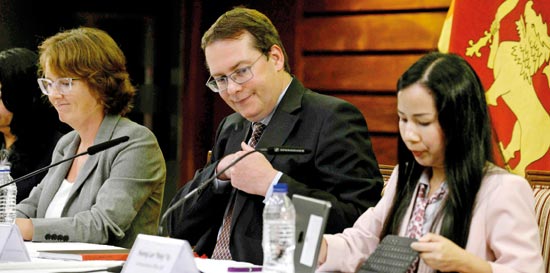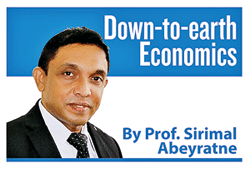Wake-up call, the second!
View(s):
IMF officials at a media briefing in Colombo
The IMF team on Wednesday concluded its first visit to Sri Lanka after reaching its 17th agreement with the country. Its statement on the same day after reviewing the Extended Fund Facility (EFF) arrangement with Sri Lanka that was approved in March this year, portrays a “grey-outcome” of the country’s progress so far.
Though the IMF mission admits a few commendable developments, in an overall assessment it’s a wake-up call. In fact, it is the second wake-up call to bring the economy on track, after we heard the first wake-up call with the country falling to an unprecedented crisis due to our own fault.
The economic crisis was clear enough to understand how the democratic governments that we elected from time to time deceived the people and brought the economy to collapse. With or without the IMF support, we would have acted swiftly and made cause corrections. History proves that we haven’t done it continuously so that we had to seek IMF assistance repeatedly for 16 times.
Business as usual
Fuel queues disappeared, supply shortages relieved, COVID pandemic ended, and after all, even the “Galle Face aragalaya” got dissolved without a “system change” or a major calamity. Many seem to have perceived that everything was now going to be “tickety-boo” again with the promise of the IMF assistance, despite increased hardship for the public.
 As many got back to their business as usual, there was no broader consensus for the recovery and progress. Some seem to have got back to their former life-styles with perks and privileges, while some others fought for reversing policy decisions for the recovery path in favour of their own interests. And, some more thought it is a good fertile ground for renewing the subdued old political battles for power.
As many got back to their business as usual, there was no broader consensus for the recovery and progress. Some seem to have got back to their former life-styles with perks and privileges, while some others fought for reversing policy decisions for the recovery path in favour of their own interests. And, some more thought it is a good fertile ground for renewing the subdued old political battles for power.
But there were few who understood that the economy is not moving forward as fast as expected. The economy was only shifted out of the “Intensive Care Unit” but it continued to be bed-ridden and needed deeper and longer cause correction in a much wider scale. While the treatments are either getting delayed or coming in a piece-meal manner for whatever the reason, the economy is not yet free from its chronic vulnerability to external shocks.
Therefore, there is a greater possibility that the economy can collapse again in response to any external shock. And such a collapse might even be more severe than what was experienced during the past three years.
IMF response
The objectives of the EFF arrangement with the IMF were to restore macroeconomic stability and to achieve debt sustainability. In addition, the IMF-supported programme was aimed at protecting the poor and vulnerable, safeguarding financial stability, and stepping up structural reforms to address corruption vulnerabilities and unlock Sri Lanka’s growth potential.
The mission has acknowledged in its statement the country’s tentative signs of stabilisation. The rate of inflation has declined from its peak of 70 per cent in September 2022 to below 2 per cent in September 2023, and the stock of foreign reserves increased by US$1.5 billion during March-June this year, and the supply shortages of essentials eased.
While commending the above, the IMF mission had much to say about the sustainability and inadequacy of the progress which shows the difficulty of assuring the country’s “full economic recovery”. Economic growth remains negative in the second quarter of the year as well, foreign reserve accumulation is slower, and fiscal consolidation is below the expectations.
Fiscal consolidation requires an improved tax revenue through adopting an efficient tax administration mechanism, removing the prevailing tax exemptions, and eliminating tax evasion. To put it simply, there is no technology-based mechanism for the government to track people’s wealth, income and expenditure so that the income tax collection seems to have reduced for those who earn monthly wages in the organised sector.
External buffer
Foreign reserve accumulation is important in order to rebuild external buffers against the country’s external vulnerability, as per the IMF mission. In fact, this is paramount important as it is the direct outcome of “stable” ways and means of foreign exchange earnings. To say the least, we are counting on increased tourist arrivals (with an imposition of a minimum hotel rate), renewed remittance flows, and further borrowings from multilateral sources.
A breakthrough in foreign direct investment (FDI) flows and export growth as “stable sources” of foreign exchange earnings is yet to be seen in the coming years. Apparently, for an economy that has been maintaining a poor record of FDI flows and export growth for over two decades, putting the economy back on track is more than a medium-term agenda.
The agenda is even more challenging than it was ever before because we are looking at this fundamental issue only after experiencing its bitter consequences through the current economic crisis. As at present, Sri Lanka is an “isolated economy” which is in trouble in the globalising Asia. The investors should be convinced that the country is progressing to be a competitive open economy in the region, which is yet to be seen through our policy and regulatory reforms in the coming years.
The IMF mission has acknowledged that the government has made steady progress on structural reforms. While some of the key legislations have been passed in Parliament, including the new Central Bank Act and the Anti-Corruption Act, they could help in improving governance, but only “…if implemented effectively”.
Poor implementation
The striking point here in the IMF statement is “…if implemented effectively”. By looking at its deeper issue is that Sri Lanka also has a “poor implementation record” of even the existing laws and regulations.
Bribery and corruption issues have been widespread and escalating to historical heights, but law enforcement has been deteriorating. Therefore, passing new laws is meaningless, unless they are “implemented effectively” as the IMF mission has categorically noted.
The poor implementation record of the country could be extended beyond anti-corruption, to cover much of development activities and public administration. The public sector efficiency has been at stake due to responsibility and accountability issues, lack of policy directions, and intuitional fragmentation.
Many of the ministries which do not have a policy direction spend their valuable time to deal with day-to-day administrative matters and individual cases. Even if they have a policy direction, increased institutional fragmentation with split subject areas among many ministries, departments and agencies has created issues of coordination, mutilation, and conflict.
The issue is that the political realities hardly permit a major breakthrough in the country’s administrative mechanism in order to enact effective implementation of any laws and policies. The challenge is that at a time that the country needs to get out of the crisis and to recover and progress fast, it should be able to overcome this major bottleneck – the inefficient implementation mechanism.
Mediocre outcome
With the restructuring of both domestic and foreign debt, Sri Lanka has been progressing in order to achieve debt sustainability and to regain its credit-worthiness. However, there should be something more beyond “debt sustainability and credit-worthiness”, because the country’s main objective is we should not be in a position to borrow again.
Rather than ending the economic recovery process with a mediocre outcome, the Sri Lankan economy should be soon on a path to ensure a sustainable higher growth momentum. The first review by the IMF mission is an alarming signal for that, not only to the authorities in power but also to all others who exercise power with or without being in power.
Sri Lanka needs all these reforms not because the IMF needs them but because the country needs them. However, the IMF mission has concluded its review “…with the goal of reaching a staff-level agreement in the near term” and reaffirming its commitment to support Sri Lanka at this difficult time.
(The writer is a former Professor of Economics at the University of Colombo and can be reached at sirimal@econ.cmb.ac.lk and follow on Twitter @SirimalAshoka).
Hitad.lk has you covered with quality used or brand new cars for sale that are budget friendly yet reliable! Now is the time to sell your old ride for something more attractive to today's modern automotive market demands. Browse through our selection of affordable options now on Hitad.lk before deciding on what will work best for you!


